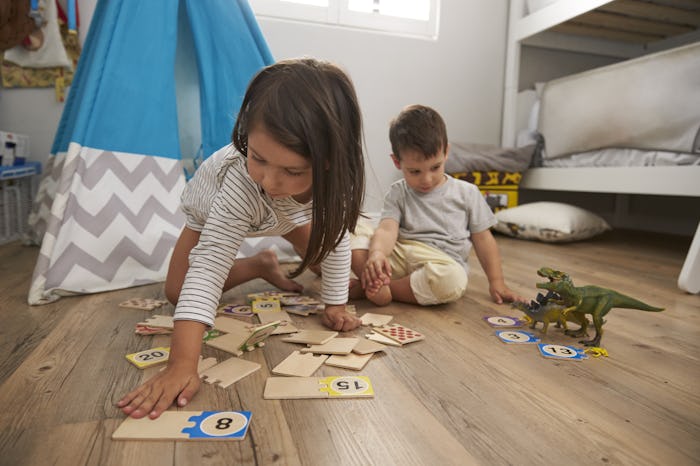Life

The Pros & Cons Of Siblings Sharing A Room
If you grew up with a sibling, you likely shared a room with one another at some point. There were probably things you liked about the situation and things you thought were completely terrible when you think back on the experience. If you're now a parent, your kids are relatively close in age, and you're starting to run out of bedrooms, you may be considering having them share a room. And if you're considering going down that road, you may be curious as to how sharing a room with a sibling affects your kid later in life.
There are actually some benefits that come along with having shared a room with your sibling earlier in life. In an interview with the Chicago Tribune, licensed clinical psychologist and co-author of Siblings: You're Stuck With Each Other, So Stick Together James Crist said that sharing a room helps kids with anxiety feel more at ease than if they're in a room alone. Additionally, sharing a room with a sibling when you're younger can help you learn the ins and outs of negotiation sooner as well as how to settle disagreements on your own. Not only that, but shared spaces are a regular part of adult life — whether dorm rooms, offices, apartments, or something else — according to Babble. Learning how to operate in a space that's not entirely yours when you're young can only mean greater chancers of success when it's required later on.
Additionally, parent educator and co-author of Siblings Without Rivalry, Adele Faber told Parents that learning how to discern how another person's feeling and how to defend themselves while sharing a room at a young age is something that they can take into future relationships as they grow older. Developing emotional intelligence can help you navigate all kinds of adult situations. It's important in relationships with family, friends, a partner, colleagues, and even a person you're meeting for the first time. Learning what you can and will put up with while living in close proximity to another person (and how to defend yourself when those lines are crossed) is also important for later in life. Garnering these skills at an early age means that they're likely second nature by the time you need them as an adult.
Of course, small kids sharing a one room can also lead to conflict. However, this too can be useful when it comes to building character and developing into a more mature person. According to Professor's House, arguments are important for the development of social skills. When kids experience this at a young age, maybe they won't have as many issues with it later on in life. As Faber said in the previously-mentioned Parents article, learning how to find a solution to these conflicts can teach flexibility and sensitivity to another's feelings, both of which they will carry with them as they continue to grow up.
And, unsurprisingly, siblings who share a room when they're younger may develop close relationships that extend past the years they shared a sleeping space. In the aforementioned article from The Chicago Tribune, clinical psychologist and author of Peaceful Parent, Happy Sibling Laura Markham said that many siblings who share a room wind down from the day by having a nice long chat before finally dozing off. Over time, this translates into a stronger, deeper relationship than they may have formed without those nightly talks.
Whether you're going to have your kids share a room or not — and for how long — is something that you have to decide using your own judgement. That being said, it's difficult to ignore the fact that there are real, long-term benefits that they could acquire from doing so.